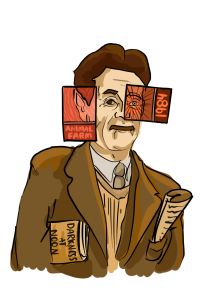Orwell: The Power of Language
Using language, the author repeatedly warned – and explained – how to control the thoughts of the masses.
George Orwell (Eric Blair) wrote his two bestselling novels, Animal Farm and 1984, in the same vein: both cautionary tales, extremely dysphemistic in nature, and closed with the flourish of an unfinished thought, like the apogee of an aria, hanging in the air and leaving the reader high on every last word. Undoubtedly one of the greatest writers of all time, the main themes present in his writing draw a reader towards dystopia, warnings of totalitarian governments, the corruption that power brings with it, and the perils of imperial rule. The books also weave within them a trend through which this total governance is achieved, and it is concerning it that this article is written.
Animal Farm follows the revolt of barnyard animals against their neglectful human oppressor, forming their own government based on the principles and pride of being equal creatures, and slowly turning to a new order of oppression, seeping from the greed of those in power. 1984, in turn, was finished by Orwell months before his death, and is largely speculated to have been titled so as a reconstruction of its creation year (1948) and/or an estimate of when Orwell thought his work might have a semblance to the state of the world. A totalitarian government suffocates every waking moment of Winston Smith’s life, driving him to secret meetings, closed-door written confessions, and conspiracy that culminates to an incredible climax from which the book docks its fame. The totalitarian government in 1984 and the new governance established by the pigs in Animal Farm control the actions of its people, maintain their loyalty through linguistic and psychological manipulations (see “comrade”), but limit their thoughts of revolt and the scope of their knowledge by barricading outside information, past and present, and leaving their subjects in the dark, to be guided solely by the light they choose. This level of control, a distinctly Orwellian feature, is established in both novels through the presence (and lack of) language and literacy. In Animal Farm, most of the animals are illiterate, and are unable to read or recognize when the rules are amended and | SPOILER: “non-profitable” animals are killed. | In 1984, Winston works in the Ministry of Truth, rewriting historical documents and shortening the dictionary so that, if the thought were ever to come to revolt, the words to materialize it would leave one silent. The title of “Ministry of Truth” itself spreads lies, the “Ministry of Love” breeds war, and the words to define both are lost to the people surrounding it. Orwell argued through his books not just that power corrupts, but that power to this degree is brought by power over knowledge, and especially power over language.
1984 addressed this more bluntly. Winston is approached by his comrade (a substitute for any other word that may sprout dissidence) Syme who works on publishing the new edition of Newspeak Dictionary (Newspeak being the present language, Oldspeak presumed being ours), incorporating words like Bellyfeel – a blind acceptance of a term without necessarily understanding it – and the famous Doublethink – accepting two contradicting thoughts simultaneously – both of which begin to form, as one reads into their meanings, a net meant to lead its speakers to blind belief – even if it is contradictory. [1] The shortening of “unnecessary” words, writing all antonyms by adding “un-” to certain terms, and implementing psychologically-laced vocabulary into the minds of its subjects allows for Big Brother (1984’s government, for which even the name insinuates intense paternalism) to control the scope of knowledge of its subjects, and for Winston Smith, pressed with a feeling he can’t understand, to rush down on his journal no words more complex than:
DOWN WITH BIG BROTHER
DOWN WITH BIG BROTHER
DOWN WITH BIG BROTHER
Down in Animal Farm, the title of the new government made by the “freed” animals, Snowball the pig rules. His predecessor, the inciter of the revolt against farmer Mr. Jones, died in the early days of the revolution, but had established a set of commandments to assure equality among all livestock, regardless of size, age, or capacity. These, painted on the barn wall, included:
- “Whatever goes upon two legs is an enemy.
- Whatever goes upon four legs, or has wings, is a friend.
- No animal shall wear clothes.
- No animal shall sleep in a bed.
- No animal shall drink alcohol.
- No animal shall kill any other animal.
- All animals are equal.”
Most of these animals, as previously mentioned, were illiterate, except for a pessimistic donkey and a handful of pigs. The rest were not taught to read, but appreciated the principles of their new society. The pigs themselves – Snowball and Squealer, specifically – once left in charge begin to change. Misinformation spreads, changes to the anthem of the farm are made, and, discreetly, the rules are “reiterated” – with a difference the other animals can’t quite discern.
“No animal shall drink alcohol.”
“No animal shall kill any other animal.”
“All animals are equal.”
“No animal shall drink alcohol to excess.”
“No animal shall kill any other animal without cause.”
“All animals are equal, but some are more equal than others.”
As animal society grows increasingly similar to the corrupt governments in Orwell’s other writings, and the tyrant rules present throughout history, human and pig blend – and as Clover, an aging horse, looks on at the dressed-up, biped pigs, the scene bears an eerie resemblance to the place they had tried to escape.
It’s easy to sideline Orwell’s predictions because of the existence of modern technology, and with it a quasi-infinite source of information available to billions. However, an alarming percentage of the world doesn’t have access to the internet. The nations that do can still be wont to propagating nationalistic media and vocabulary in its educational systems, social networks, and cultures independently (or using) its networks. Orwell’s nightmarish worlds provide real lessons to apply to our own societies, and some of his warnings ring louder every year. For now, the barrier to cross is one of knowledge – and the question to answer is how much authority we (as a people, as a state, as a kind) should have as to the understanding, education, and beliefs of others.
It’s easy to sideline Orwell’s predictions because of the existence of modern technology, and with it a quasi-infinite source of information available to billions. However, an alarming percentage of the world doesn’t have access to the internet. The nations that do can still be wont to propagating nationalistic media and vocabulary in its educational systems, social networks, and cultures independently (or using) its networks. Orwell’s nightmarish worlds provide real lessons to apply to our own societies, and some of his warnings ring louder every year. For now, the barrier to cross is one of knowledge – and the question to answer is how much authority we (as a people, as a state, as a kind) should have as to the understanding, education, and beliefs of others.
[1] For more of the 1984 dictionary – it is fascinating – please read here (https://www.thoughtco.com/1984-vocabulary-4685440)
Orwell, George. 1984. New York, New American Library, 1981.
Orwell, George. Animal Farm. William Collins, 2021.

George Orwell
@thegovernmentiscoming
Elements of Works: Dystopia and Epistemology

